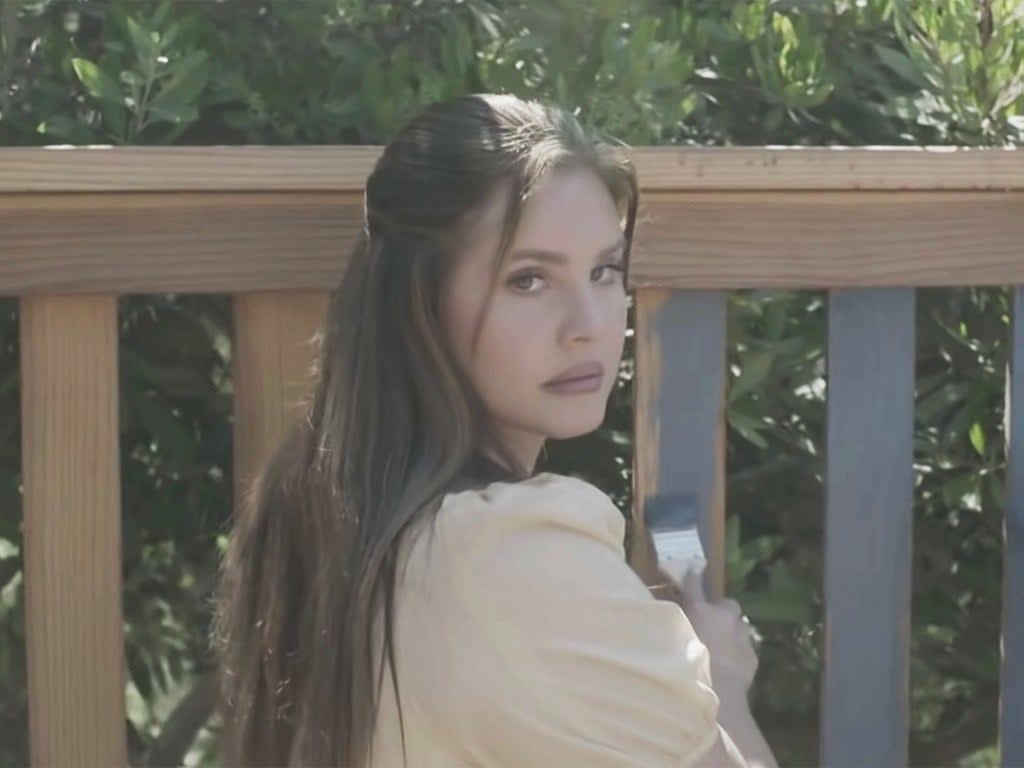Lana Del Rey review, Blue Banisters: One revelation colours the singer’s entire body of work

It’s possible that it means something entirely different in America, but there is still something kind of funny and a little queasy about Lana Del Rey’s exhortation in new release “Arcadia” to “run your hands over me like a Land Rover” – the preferred transportation of Arron Banks, Nigel Farage and the Queen.
Blue Banisters is studded with offbeat images and intimacies like this. Del Rey has pitched it as her most personal album yet. This is not quite true – the album is far more elliptical and mysterious than it first appears. It does however contain one disclosure that colours her entire body of work (more on this later).
The album credits show Del Rey working with a wider range of writers and producers than usual, including friends The Last Shadow Puppets, hip-hop producer Mike Dean, ex-boyfriend Barrie-James O’Neill, and even Italian composer Ennio Morricone. There is one track from long-time collaborator Rick Nowels, “Cherry Blossom”, which reportedly dates back to the 2012 Ultraviolence sessions. The last track, “Sweet Carolina”, was co-written with her father and sister.
So at least in terms of its guest spots this is a deeply personal record – yet the range of collaborators may be why at times it feels musically less cohesive than her previous efforts. It is also worth noting that this is Del Rey’s second album in a year – coming just seven months after Chemtrails Over the Country Club.
Opener “Text Book” points to the country-inspired sound of her last two releases. The stunning, spacious title track is as luxurious and haunting as a Jim Buckels painting.
“Black Bathing Suit” has a chorus that calls to mind Fleetwood Mac’s “Silver Springs”; it collapses confidently into a clutter of laughter, layered voices and rustling drums.
Del Rey lapses into familiar territory with the ballads “If You Lie Down With Me”, “Beautiful” and “Violets for Roses” – but her vocals sound more self-assured than ever. “Don’t say you’re over me / When we both know that you lie,” she sings playfully on “If You Lie Down With Me”.
Things are kicked up a gear with the louche and thrilling “Dealer” – a collaboration with The Last Shadow Puppets that sounds like it was written after a week-long sesh in a Calabasas basement. “I don’t want to live,” Del Rey screams over a languid lounge beat. “Thunder” is another unreleased song from the super-supergroup that makes the cut.
“Nectar of the Gods” and “Living Legend” are both written with her ex-boyfriend – cowboy-hat-wearing Glaswegian country singer Barrie-James O’Neill, who is heavily mythologised elsewhere in Del Rey’s work. Tender but slight, they do nothing to dispel the feeling that these two were a real-life Lady Gaga and Bradley Cooper in A Star Is Born.
But towards the tail end of the record it is the astonishing “Wildflower Wildfire” – produced by long-time Kanye West collaborator Mike Dean – that burns most brightly. And here’s where that revelation comes in. “Here’s the deal ... ’cause I know you wanna talk about it” Del Rey says, in a tone that could be either resignation or a warning.
Addressing her lover (and the listener), she sings: “My father never stepped in / When his wife would rage at me.” Later came “hospitals”, “lithium” and “star drip IVs”. Finally Del Rey fears that her lover will be consumed by her and “burn, burn, burn, like the others baby”.

The juxtaposition of childhood trauma, hospitals, mood-stabilising drugs and emotional lability are deliberate and careful, and laced with venom: the bitterness of the description of her own mother as “his wife” is as cutting as anything Del Rey has ever written. It is a song that appears to be about the intergenerational legacy of trauma, and the struggle to contain an emotional intensity born out of it.
With the exception of a handful of throwaway lines and an unreleased acoustic track (“My Momma”) written under her previous stage name May Jailer, it has taken the confessional artist Lana Del Rey eight albums to write about her mother. This may mean nothing at all. But it seems relevant to observe that much of Del Rey’s oeuvre has been dedicated to excavating and interrogating her own shadow side – to the dark feminine and “bad girl” archetypes. This includes the bratty lolitas of her early work (especially the sleek, unreleased ASAP Rocky cut “Ridin’”, where she raps in a baby voice: “You say that I am flawless, true perfection / So give me all your drugs, props, money, and connections”). But it also includes the lover who feels validated by their partner’s abuse in Ultraviolence.
Every year somebody claims that Del Rey is glamorising abuse, submissiveness or self-negation for publicity – a “persona as a bad girl to whom bad things are done”, as the critic Ann Powers put it in 2019. Perhaps this elucidation of her own past points to an alternative interpretation.


